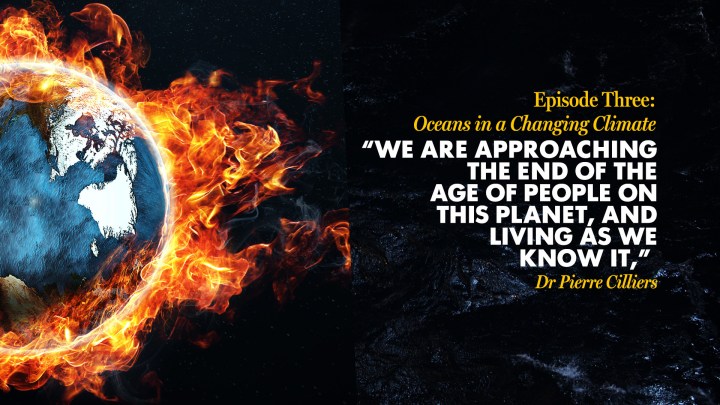MAVERICK LIFE VIDEO SERIES
On the Edge of Change, Episode Three: Oceans in a changing climate

This week’s episode of On the Edge of Change reveals how seriously the climate crisis is affecting our oceans.
According to the International Union for Conservation of Nature (IUCN), “at the front line of climate change, the ocean, the coastlines and coastal communities are being disproportionately impacted by increasing carbon dioxide (CO2) and other greenhouse gas (GHG) emissions from human activities”.
This assessment is shared by Professor Isabelle Ansorge who notes that “we have all this excess carbon, so what we’re starting to see is that the oceans are responding by taking up a lot of this carbon”.
Oceans cover 71% of the earth’s surface and “make up 95% of all the space available to life” says the WWF. They not only provide us with the oxygen we breathe, they “are a life-support system” for our planet, a source of food and vehicle for trade.
IUCN adds that “The ocean plays a central role in regulating the Earth’s climate. The Fifth Assessment Report published by the Intergovernmental Panel on Climate Change (IPCC) in 2013 revealed that it has thus far absorbed 93% of the extra energy from the enhanced greenhouse effect, with warming now being observed at depths of 1,000m.
“As a consequence, this has led to increased ocean stratification (prevention of water mixing due to different properties of water masses), changes in ocean current regimes, and expansion of depleted oxygen zones. Changes in the geographical ranges of marine species and shifts in growing seasons, as well as in the diversity and abundance of species communities are now being observed. At the same time, weather patterns are changing, with extreme events increasing in frequency”.
That was back in 2013.
Six years later, rising sea levels seem an irresistible threat – according to the World Meteorological Organisation (WMO), “The last time the Earth experienced a comparable concentration of CO2 (carbon dioxide in the atmosphere) was three to five million years ago when the temperature was 2-3°C warmer and the sea level was 10-20 metres higher than now”; the melting of polar ice a sore reality – scientists have said that approximately 217 billion tons of ice (197 billion metric tons of water) melted into the Atlantic Ocean in July this year; and warming oceans can change currents, making monitoring the Agulhas a foremost necessity.
In the next episode of On the Edge of Change, we look at sea-level rise; what threats does it pose; how fast is it accelerating; what are we doing about it. ML
The miniseries On the Edge of Change will be published every Wednesday on Maverick Life and Daily Maverick. To see all the videos, subscribe to our YouTube channel
















 Become an Insider
Become an Insider